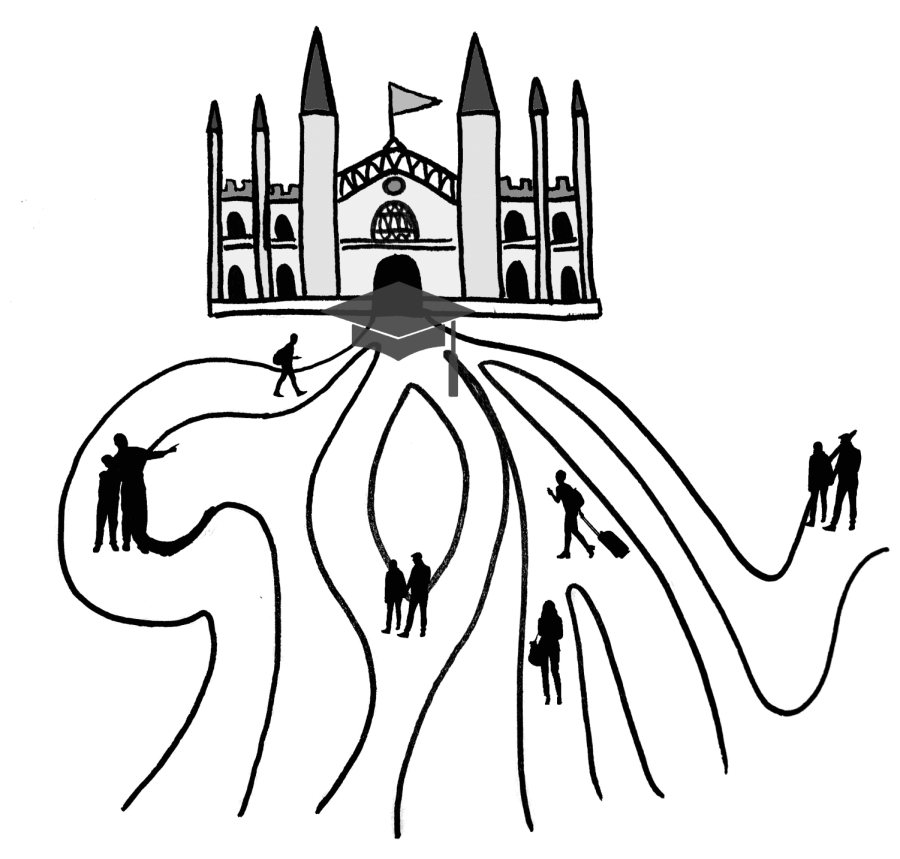Perspectives (Issue 2)
October 17, 2018
College-centric mindset limits options after high school
While still in high school, our college-centric mindset as a school is a double-edged sword. In some cases, it serves as the impetus for high schoolers to start to do more while at other times, it causes a toxic environment where all decisions are seen as ones that further a path to college.
However, our college-centric mindset also, possibly more detrimentally, impacts the way we look at life after high school. It constricts our thinking to one path out of high school: a bachelor’s program in a prestigious university followed by more education or a job. This ultimately only limits our future choices and decisions.
This path may be the one that many from Harker choose to take, but it is obviously not the only path we can take. Opting to take a gap year between high school and college has obvious benefits in that it is a full year to focus on personal growth free of any and all restrictions caused by a university education. Another option that is too often overlooked is the military; while it is not common at Harker to pursue a career that includes serving in the military, it is a possibility that has its own advantages and should be treated as such. These two possibilities are just two of a multitude of legitimate options that we should think about when considering our post-Harker life and education.
While it is completely logical to already have a plan in mind as to a future after high school, it is equally logical to have an open mind, making sure to look at all the possibilities. The latter, however, is rarely exercised and is often discouraged as our community mindset causes these alternative options to be unfairly disregarded and ignored.
College-centric mindset undermines personal growth
At Harker, we undoubtedly have a culture that focuses primarily on colleges, and, at first, this may not seem bad; it, in theory, encourages our high-schoolers to strive for excellence in all aspects of their life aiming to be accepted into the college of their dreams. However, as we dive closer to the heart of what this entails, it is apparent that some problems exist.
To get into college, we build a lengthy resume complete with accomplishments in all aspects of life, both academics and extracurriculars, but as we try to build up these resumes, we lose sight of why we should do what we are doing.
Having an active role in a lot of clubs is seen as an effort to add another line to a resume rather than an expression of genuine interest. A choice to participate in competitions often boils down to wanting an award. Volunteering and community service has strayed far from its original objective of personal and community growth to a more sinister one of winning a competition of hours or of receiving a service award. Getting a good grade on an assignment is not seen as proof of how much learning or studying was done but rather as one step closer to an acceptance letter.
This problem goes far deeper than those who simply choose to do these activities for the above reasons. The duplicitous nature of our seemingly benign actions has become our brand, the Harker brand where college acceptance is the ultimate goal of all choices in high school. Even those who choose to join and found clubs out of real interest or volunteer out of a desire to help their community or take part in initiatives with good intentions will be written off as those who want to pad their resumes, and that is the saddest outcome of such a culture.
This piece was originally published in the pages of The Winged Post on Oct. 17, 2018.


















![“[Building nerf blasters] became this outlet of creativity for me that hasn't been matched by anything else. The process [of] making a build complete to your desire is such a painstakingly difficult process, but I've had to learn from [the skills needed from] soldering to proper painting. There's so many different options for everything, if you think about it, it exists. The best part is [that] if it doesn't exist, you can build it yourself," Ishaan Parate said.](https://harkeraquila.com/wp-content/uploads/2022/08/DSC_8149-900x604.jpg)




![“When I came into high school, I was ready to be a follower. But DECA was a game changer for me. It helped me overcome my fear of public speaking, and it's played such a major role in who I've become today. To be able to successfully lead a chapter of 150 students, an officer team and be one of the upperclassmen I once really admired is something I'm [really] proud of,” Anvitha Tummala ('21) said.](https://harkeraquila.com/wp-content/uploads/2021/07/Screen-Shot-2021-07-25-at-9.50.05-AM-900x594.png)







![“I think getting up in the morning and having a sense of purpose [is exciting]. I think without a certain amount of drive, life is kind of obsolete and mundane, and I think having that every single day is what makes each day unique and kind of makes life exciting,” Neymika Jain (12) said.](https://harkeraquila.com/wp-content/uploads/2017/06/Screen-Shot-2017-06-03-at-4.54.16-PM.png)








![“My slogan is ‘slow feet, don’t eat, and I’m hungry.’ You need to run fast to get where you are–you aren't going to get those championships if you aren't fast,” Angel Cervantes (12) said. “I want to do well in school on my tests and in track and win championships for my team. I live by that, [and] I can do that anywhere: in the classroom or on the field.”](https://harkeraquila.com/wp-content/uploads/2018/06/DSC5146-900x601.jpg)
![“[Volleyball has] taught me how to fall correctly, and another thing it taught is that you don’t have to be the best at something to be good at it. If you just hit the ball in a smart way, then it still scores points and you’re good at it. You could be a background player and still make a much bigger impact on the team than you would think,” Anya Gert (’20) said.](https://harkeraquila.com/wp-content/uploads/2020/06/AnnaGert_JinTuan_HoHPhotoEdited-600x900.jpeg)

![“I'm not nearly there yet, but [my confidence has] definitely been getting better since I was pretty shy and timid coming into Harker my freshman year. I know that there's a lot of people that are really confident in what they do, and I really admire them. Everyone's so driven and that has really pushed me to kind of try to find my own place in high school and be more confident,” Alyssa Huang (’20) said.](https://harkeraquila.com/wp-content/uploads/2020/06/AlyssaHuang_EmilyChen_HoHPhoto-900x749.jpeg)







